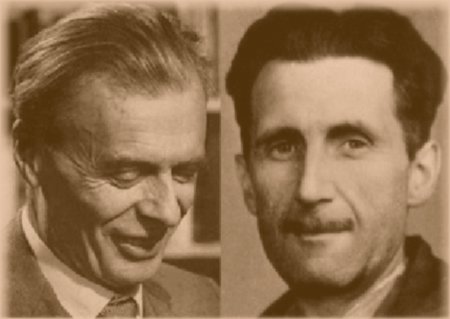George Orwell wrote Nineteen Eighty-Four . Aldous Huxley wrote Brave New World
. Aldous Huxley wrote Brave New World . Both were dire, dystopian works that speculated upon a horrid future. The two great authors were, however, wildly divergent in their fears and warnings.
. Both were dire, dystopian works that speculated upon a horrid future. The two great authors were, however, wildly divergent in their fears and warnings.

George Orwell v. Aldous Huxley – Divergent Distopian Predictions
Both Orwell and Huxley feared a future when we would be a captive culture. Orwell feared captivity by the State but Huxley feared captivity by own venality and pleasure seeking.
Orwell depicted a future society where books were banned and where the State would deprive us of information. Huxley posited a future society where would be no reason to ban a book, because there would be no one who would want to read one, but where so much data would be provided that we would be sunk into egoistic pacifism.
Orwell feared that the State would conceal the truth from us. Huxley feared the truth would be drowned out by the constant nattering stream of irrelevancies.
Simply put, Orwell feared hate and pain whereas Huxley feared love and pleasure. There is grim sense in both men’s fears; both the “carrot” and the “stick” are used to gain and maintain control.
Read the rest of this entry »
Like this:
Like Loading...
Tags: Books & Reading | Conservatives | Ethics & Morality | Huxley | Liberals | Orwell | Pain | Philosophy | Pleasure | Politics | Society | Tyranny
This entry was posted on Wednesday, October 6th, 2010 at 1:45 pm and is filed under Books & Reading, Ethics & Morality, Philosophy, Politics, Society.
You can skip to the end and leave a response. Pinging is currently not allowed.



